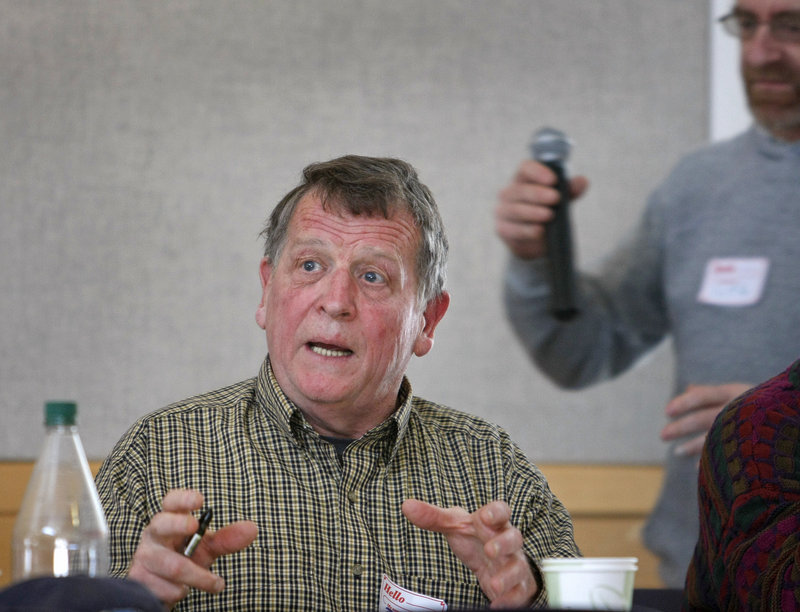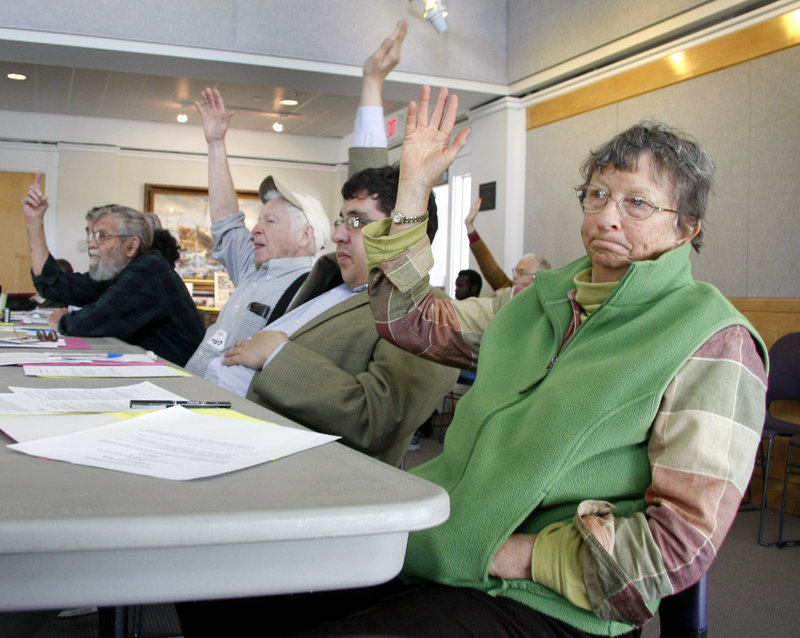BRUNSWICK – At their annual convention Sunday, members of Maine’s Green Independent Party discussed issues of ecology, social justice and grass-roots democracy. They spoke of diversity, personal and global responsibility, community-based economics, non-violence and decentralization of wealth and power. Of gender equity, future focus and sustainability.
They looked back — at a gubernatorial race without a Green candidate on the ballot — and they looked ahead — at a precedent-setting mayoral race in Maine’s largest city.
“It’s a very important race, for sure,” Fred Horch, who ran a close second in Brunswick to an incumbent Democrat in a three-way race for a seat in the State House, said of November’s ballot in Portland, where the public will elect a mayor for the first time in 87 years, and under a ranked-choice system to boot.
“I think having the mayor be a Green would give a legitimacy to the party. It would raise the profile of the party. And the policies the mayor pursues will certainly get in front of the voters,” he said.
David Marshall, a Portland city councilor, is a mayoral candidate. A Green since 2000, Marshall addressed three dozen party members Sunday in a meeting room off the Curtis Memorial Library.
Marshall talked about his accomplishments on the council, about the new geothermal heating and cooling system at Portland’s airport, about the extension of the Downeaster train service to Brunswick and the potential for passenger service between Portland and Montreal.
“My vision for the city of Portland really works to encompass the entire state of Maine, because we’re all partners here,” he said. “As mayor, I’m going to work to expand this philosophy of energy efficiency to every single building in the city.”
The resultant savings for residents, he said, could be spent to “support our great businesses, our excellent nightlife and our awesome arts scene. We have so much we can put this money into besides oil.”
With a ranked-choice system, voters will mark their first and second choices for mayor. After votes are tallied, if no candidate has a majority, the last-place finisher will be dropped and that candidate’s second-choice votes will be allocated. The process continues until one candidate attains a majority.
Such a system, Horch said, eliminates the splitting-the-vote argument often used against Green candidates in a three-way race and leaves voters with a candidate who can legitimately claim a majority representation. He noted that each of Maine’s most recent three governors, Republican Paul LePage, Democrat John Baldacci and independent Angus King, won his first term by plurality rather than majority.
“So now people are going to see how that system works,” Horch said. “If you really want to be Green, but you really don’t want to (vote for) a Republican, now you can vote Green first, Democrat second.”
Horch received one of three awards presented Sunday, as Green of the Year. Tom MacMillan of Portland won New Green of the Year and Lynne Williams of Bar Harbor, who failed to collect enough signatures to get in the governor’s race but wound up with 12.6 percent of the vote in a bid for Senate District 28 won by Republican Brian Langley, won Candidate of the Year.
Each received a framed, hand-painted work of art featuring a black-capped chickadee perched on a horizontal sunflower with an olive background, reminiscent of the Woodstock poster of a dove on the neck of a guitar.
Other featured speakers were Sarah Bigney of the Maine AFL-CIO, who talked about legislative attacks on unions and working families, and Ben Chipman of Portland, the only independent member of the House and a former Green Party member. A former legislative aide to John Eder, who served two terms as a Green Party representative to the Legislature from Portland, Chipman talked about a few of the 17 bills he has introduced this session.
“I’m trying to be on the offensive,” he said, “in spite of who’s in charge.”
One bill of particular interest to Greens would change the number of signatures required to get on the gubernatorial ballot from 2,000 to either 2 percent of the membership of a political party or 2,000 — whichever is less. Anne Trevorrow, party secretary, said there are currently more than 33,000 registered Green Party members in Maine.
“This is the time that all of the people who are most concerned with the Green Party come together and set the goals for the upcoming year,” Trevorrow said.
“We assess what we did this year, what we could do better for next year, and really make sure that we’re on the track that’s responsible to our membership.”
Staff Writer Glenn Jordan can be contacted at 791-6425 or at:
gjordan@pressherald.com
Send questions/comments to the editors.





Success. Please wait for the page to reload. If the page does not reload within 5 seconds, please refresh the page.
Enter your email and password to access comments.
Hi, to comment on stories you must . This profile is in addition to your subscription and website login.
Already have a commenting profile? .
Invalid username/password.
Please check your email to confirm and complete your registration.
Only subscribers are eligible to post comments. Please subscribe or login first for digital access. Here’s why.
Use the form below to reset your password. When you've submitted your account email, we will send an email with a reset code.